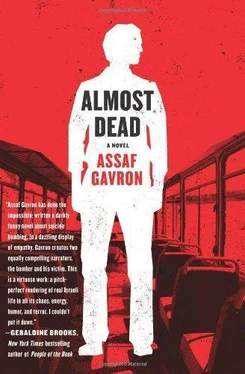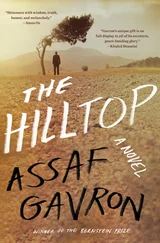From the Israelis’ most dangerous enemy to the least of their servants. It was a humiliating comedown, but I kept at it. I told myself that I wasn’t working for the Jews but for Samir, that Israeli money was going into Palestinian pockets, and to remind myself that I wasn’t a traitor to my people I would commit petty crimes: I took food and drink from the kitchens and pens from the desks. Reparations on a tiny scale. Once I saw a hand-held computer on a desk and fitted it into the palm of my hand, pushed the buttons, caressed the orange plastic. I almost took it.
But always there was Bilahl in my head, sneering at my insistence on seeing the glass as half full. I held the glass up and examined it. Which was it? Half full or half empty? It was both, dear brother. I worked for them, but I never forgot who they were. I didn’t pretend not to see the looks the security guards gave us whenever we talked Arabic among ourselves or simply clustered together at lunch. How could Bilahl say I was bowing my head to them, or not doing enough for the cause? What was he doing? There were likeable people in the offices, but I made it a principle not to like them, not to cross the line.
Only once did I cross it. I was in the office I cleaned last. It was evening and most of the workers had gone home. Except for the humming of the computers and music from one of the more distant rooms, it was completely quiet. I ate a few biscuits and drank a cup of coffee in the kitchenette, and then headed out to bag the garbage and replace the bin liners. I was clearing the used coffee cups from the desks when I saw the orange gadget again. I picked it up from its cradle and fiddled with its buttons.
‘You can have it,’ said a voice from behind me.
I spun round in alarm. ‘What?’
‘You can have it.’
Just an ordinary Israeli guy with a big Israeli nose and heavy-lidded eyes, who I’d seen in the office a couple of times. But as he stood in front of me and spoke, and I connected his voice to his face, I suddenly realised I’d seen him before. I dredged up rusty Hebrew from the depths of my brain.
‘I can have it?’
‘Yeah. I noticed you looking at it. It’s not working. But you can have it if you want.’
I looked at the little orange device. Was he doing this to humiliate me? I put it in my pocket and kept looking at him.
‘What?’ he said. ‘I need to get back to my desk. Do you mind?’
I moved aside and he flopped, rather wearily, into his chair. For a moment I stayed where I was, examining his face.
‘What?’ he said again. ‘The Palm is yours. What now?’
I knew what it was now. Noah’s Ark . I wanted to ask him about it. But he was just some arrogant, self-satisfied Israeli. Why bother?
‘Nothing. Thanks,’ I said, and beat a retreat, his eyes crawling all over the back of my neck. I kept thinking about him on the way home and the rest of that evening. His Noah’s Ark had been a few months ago. He’d had some weird name, which Tommy Musari kept repeating. And his partner in the couple (‘Two by two! Two by two!’) had been some imbecile girl from the army…I put his Palm on my shelf and tried to recall how the show had gone. First time I’d ever seen someone who’d been on Noah’s Ark . Pity he was such a son of a bitch, but what else would you expect from a Jew?
Yeah. What else?
‘ Well, Svetlana? ’
‘ Well, Dr Hartom…there’s nothing much to say. He’s been the same for weeks. ’
‘ Well. We’re getting near the point where we can make a pretty accurate prognosis… ’
‘ But there’s still a chance he’ll come out of it? ’
‘ There’s always a chance. ’
‘ But what kind of…? What percentage? ’
‘ Svetlana, please. I’m relying on you to keep me informed of any changes whatsoever. Anything at all .’
‘ Yes, Doctor .’
‘What day does Elvis come?’
Elvis was our cleaner.
‘Tuesdays, remember?’ Duchi said. ‘Obviously Tuesdays. You used to know that sort…’
‘Where’s he from?’
‘What? Somewhere in the south of the city, maybe?’ she said. ‘Down where all the foreign workers live?’
‘I mean which country?’
‘Ah. I don’t know. Is it Ghana?’
‘Ghana…What bit of Africa’s that?’
‘I don’t know, Croc.’
‘Near to the Congo?’
‘Congo’s in the middle somewhere. I don’t know.’
‘Well, who were Ghana a colony of?’
‘I don’t know! Why are you asking me all these questions? Is this something to do with cleaning the flat?’
‘No,’ I said, a little absent-mindedly perhaps, a little inattentive, ‘it’s for work. I need someone who speaks French and Flemish in an African accent.’
This was what lit the fuse of our final row. It irritated her that I was thinking about work and not about home. Duchi used to hope that we could go back to how it had been before. But we never did, and for months we were on the verge, on the verge…and then came the attacks. She understood the gravity of what had happened to me; she gave me time and tried to help (she did help); she accepted the weekly trips to Jerusalem, the sleepless nights, the nervousness, the ruined concentration, the demotion, the drop in salary; she tolerated Bar BaraBush, the long silences, my generally vile behaviour towards her, the evenings with Bar, and the obsession with a comatose girl in Jerusalem…she tolerated all this because she thought it wasn’t ‘the real Croc’. She tried not to judge. It was Uri, of all people — the therapist who used to tell her to get rid of me — who had told her to be patient.
She contacted Ilan, who told her that I’d erected a defensive wall around myself which I was in denial about. Everyone close to me, especially her — he said — ought to give me as much warmth, understanding and positive reinforcement as they could. It was crucial to try to reproduce the conditions of my previous life, as far as it was possible. So she’d tried, though there were days when she’d had enough and hated my guts. And hating me made her feel guilty. Being absorbed in her work made her feel guiltier. With every passing day she hated herself and me more. She said that she had never been unhappier. I didn’t care about her, or anything at all! Not once— not once —since September 11th had we talked about the wedding or our relationship.
‘You don’t pay attention to me, you never ask me about my life, you don’t care how I feel, don’t do anything for the house, and I have lost hope , Croc,’ she said. ‘I have lost hope that things are ever going to change.’
‘What about all that fruit I bought the other day?’ I went to the fridge, took out the half of watermelon and held it out like an exhibit in court. ‘What’s this?’ She just carried on crying, as she had throughout her speech. ‘What the fuck is this if not something for the house?’ She couldn’t answer. She shook her head.
‘What?’ I screamed. ‘I can’t hear you!’ I swivelled and threw the half-watermelon out of the open window. ‘Huh?’ Faintly, we heard the splatter of the watermelon three floors below.
She said, ‘I’m sorry, Croc. I’m so sorry. But I can’t. I’m going out of my mind!’ She was hardly able to speak, sucking in deep wet gulps of air. She said that she had really tried but she no longer believed things were going to change. I couldn’t function as part of a couple right now. I couldn’t deal with the responsibility and effort of a relationship.
‘Maybe a shock will help. You know. The shock of splitting up, it might help you…come back. And…and if that happens maybe we could see, but I just can’t be around you any more, Croc.’
Читать дальше












